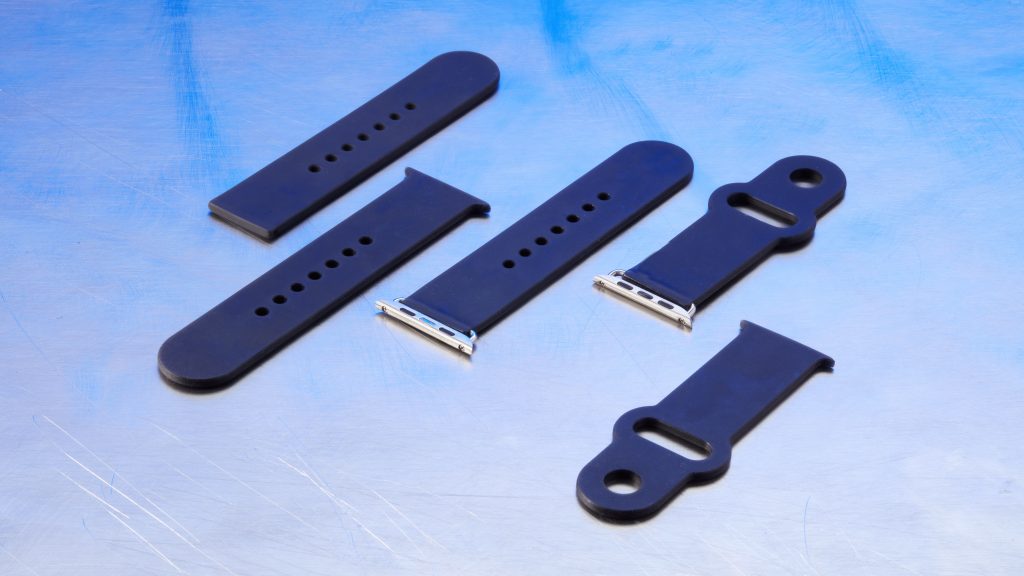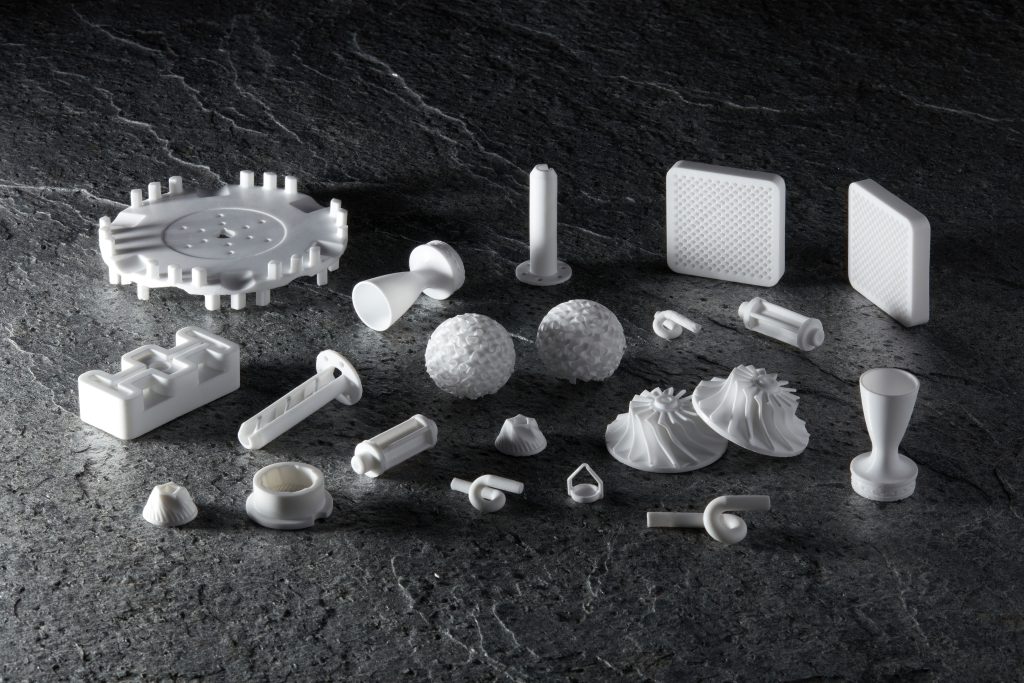Nominate now for the 3D Printing Industry Awards 2023.
3D printer OEM Formlabs has launched two new materials, Silicone 40A and Alumina 4N Resin, alongside a new Open Platform option that enables third party material access, personalizable 3D print settings, and open material 3D printing.
What’s more, the company has also increased accessibility to its SLS ecosystem with Fuse Starter Package, enabled by Fuse Depowdering Kit.
Formlabs’ two new high performance materials are targeted towards industrial, automotive, and manufacturing verticals, and bring the company’s growing proprietary resin portfolio to over 45. The new materials will be debuted at The Digital Factory Conference at SoWa Power Station in Boston on September 13, 2023.
Silicone 40A, Alumina 4N, and Fuse Starter Package are all available to purchase now. The PreForm Print Settings Editor is set to be released in early October, while the Open Material License will be available in early Q1 2024. Prospective customers can learn more via the Formlabs website.
“So much attention in the additive industry is focused on hardware, but materials are just as essential for delivering on our mission to create user-friendly, cost-effective 3D printing solutions so that anyone can make anything,” commented Formlabs co-founder and CEO Max Lobovsky. “That’s why we continue to innovate relentlessly in the material space, creating high-performance materials that unlock new possibilities in manufacturing, healthcare and other industries.”
“With Silicone 40A and Alumina 4N, we’re combining the flexibility and efficiency of 3D printing and the performance of silicones and ceramics, at a price point that anyone can afford. We’re thrilled to both expand our ecosystem and make our Fuse 3D printers more accessible so our customers and new users can truly create anything at an affordable price.”

Silicone 40A: an accessible 100% silicone resin
According to Formlabs, its new Silicone 40A Resin combines the material properties of cast silicone with manufacturing flexibility of 3D printing to boost design freedom whilst eliminating the labor intensive molding and casting process.
Incorporating Formlabs’ patent-pending Pure Silicone Technology, Silicone 40A allows users to 3D print 100% silicone parts with complex geometries in-house and in a matter of hours. Ideal for the production of functional prototypes and end-use parts, this new resin can produce soft, pliable, and durable components capable of withstanding compression, flexing, and stretching.
Moreover, Formlabs claims that its new silicone offering can create parts that possess excellent thermal and chemical resistance. As such, Silicone 40A is particularly well suited to industrial and automotive applications. Consumer products such as wearables and medical devices are also highlighted as ideal use cases of this new resin.
“Silicone 40A Resin gives me the flexibility to do designs that previously could only be done with a very expensive and time-consuming molding process, allowing us to explore new markets and manufacture products that would have been prohibitively expensive or complicated before,” explained Guy Cardwell, director of research and development at HGM Automotive Electronics.
“Other 3D printing solutions can print some kinds of elastics, but only the SLA Formlabs printer using Silicone 40A Resin can create soft connector seals that match the quality and durability of a silicone or TPU molded part.”

Alumina 4N resin for high purity technical ceramics
Alumina 4N Resin is a technical ceramic, and possesses 98.6% relative density and 99.9%-purity. As a result, this new material is said to be especially reliable in extreme conditions for parts that are thermally resistant, abrasion resistant, mechanically strong, and chemically inert.
According to Formlabs, Alumina 4N has been designed to withstand the extreme environments characterizing the manufacturing, defense, foundry, chemical, automotive, and semiconductor industries. Additionally, this new resin is said to remove the need for expensive tooling, reduce production costs, and enable shorter development cycles.
Alumina 4N is also said to unlock the affordability, design freedom and performance of additive manufacturing for ceramic engineering. Indeed, when used in conjunction with Alumina 4N resin, Formlabs claims that its Form 3+ 3D printers are the most affordable and user-friendly SLA ceramic 3D printers on the market.
“Alumina 4N Resin is remarkably easy to work with and plugs into our workflow seamlessly,” commented Benjamin Lam, Materials Research Engineer at the Air Force Research Laboratory. “It fits a need in the market, with a low barrier of entry that allows us to rapidly iterate on designs and produce parts at a comparably low cost.”

Formlabs’ new Open Platform
The new OpenPlatform incorporates three novel features that are said to drastically expand the capabilities of SLA 3D printers from Formlabs.
The first feature, ‘Certified Materials,’ provides users with a curated selection of best-in-class third party resins. The first of these resins come from Kulzer GmbH, and are targeted at enabling dental biocompatible applications for Formlabs customers in the APAC region.
‘Print Settings Editor’, a new PreForm feature, allows advanced users to modify 3D print settings to tailor their 3D print performance to their needs.
Additionally, ‘Open Material License’ has been added. This optional, paid software license allows expert users to 3D print with any 405 nm photopolymer resin they wish.
Expanding SLS 3D printing with the Fuse Starter Package
Formlabs has also launched its new Starter Package, a “comprehensive solution” that is said to open the doors to professional-grade part production using high-performance materials. Designed to be used alongside Formlabs’ Fuse 1+ 30W 3D printer, the Starter Package is priced at $24,999.
This new offering includes the new Fuse Depowdering Kit, an all-in-one de-powdering system for low-volume production that is compatible with a wide range of materials.
According to Formlabs, the Starter Kit will unlock access to a “complete professional SLS ecosystem for low-volume production at a low price point.” Through this offering, users can add the Fuse Depowdering Kit to their additive manufacturing workflow. This will enable them to achieve easy material changes without needing to clean post-processing machinery.

New resins in additive manufacturing
Away from Formlabs, Netherlands-based 3D printing resin manufacturer Liqcreate recently launched Bio-Med Clear, a new biocompatible 3D printing resin for MSLA, LCD, DLP and SLA 3D printers. Bio-Med Clear is Ideal for applications that require non-cytotoxic, non-sensitizing and non-irritating features, and is available now through the Liqcreate online shop.
Earlier this year, during Rapid + TCT 2023, 3D printing materials manufacturer polySpectra launched COR Bio, a new Cyclic Olefin Resin. Boasting a novel combination of toughness, biocompatibility and autoclavability, COR Bio is well suited to the production of end-use 3D printed medical devices. According to polySpectra, COR Bio is “set to improve” the 3D printing industry, opening up new possibilities for healthcare and consumer product manufacturing.
Subscribe to the 3D Printing Industry newsletter to keep up to date with the latest 3D printing news. You can also follow us on Twitter, like our Facebook page, and subscribe to the 3D Printing Industry Youtube channel to access more exclusive content.
Are you interested in working in the additive manufacturing industry? Visit 3D Printing Jobs to view a selection of available roles and kickstart your career.
Parts 3D printed using Formlabs’ Alumina 4N material. Photo via Formlabs.


